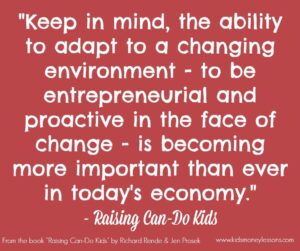How to Raise Successful Kids
Raising entrepreneurial, successful kids means less hands-on parenting and structure and more optimism and gratitude.

This post contains affiliate links, see my Disclosure Policy.
When she was a child, Jen Prosek’s dad had an unusual ritual. Every morning he would open the kitchen window and yell out: “Hello, world! What a beautiful day! Thank you for this day!”
If friends were over, Jen would cringe with embarrassment that her dad was so brazen. And when she was home alone with her family, she was grateful they lived on four acres of land in a rural town.
But now as an adult, Jen feels it was her parent’s positive thinking and grateful attitude, among other things, that allowed her to become a successful entrepreneur and begin one of the largest independent public relations firms in the U.S., Prosek Partners.
Wanting to understand what it was about her childhood that helped her become a successful business woman, Jen contacted Richard Rende, a developmental psychologist, to collaborate on a book about how to raise successful kids.
And not just successful kids – since, let’s face it, nearly every parenting book these days is about how to turn kids into a success story – but how to raise the kind of kids who enter the workplace able to adapt to change, who aren’t afraid to roll-up their sleeves and get dirty, and who can brush themselves off after a failure and continue to progress forward. Essentially, kids who possess the same character traits as successful entrepreneurs.
As the book says: “…career success in the years to come won’t stem as much from who you know or your academic credentials (what you have); it will depend simply on whether you have the right skills – most of all, the ability to learn, grow, and reinvent yourself or what you can do.”
How to Raise Entrepreneurial Kids with a Can-Do Mindset
Prosek’s and Rende’s book, “Raising Can-Do Kids: Giving Children the Tools to Thrive in a Fast-Changing World” is essentially a how-to manual for parents that is backed up by the latest in child development research.
Throughout their years of research, the authors concluded that there are seven key entrepreneurial traits parents can focus on to raise the next Steve Jobs or Mark Zuckerberg, including:
- Exploration
- Innovation
- Optimism
- Risk-taking
- Industriousness
- Likeability
- Serving Others
Gaining these skills means growing up in an environment of freedom that fosters curiosity, independence, and a willingness to figure things out on one’s own.
In essence, it means that parents need to step back, stop hovering, and whenever possible give kids the chance to be independent. This goes for even very young kids and yes, even babies.
Going Against the Norm
Take Dan Harple, a tech entrepreneur who despite his background has purposefully made sure his kids have plenty of technology-free time for exploration. Sure his kids have activities, and yes, they have used computers, but the majority of their time is unstructured – left for them to explore and figure things out on their own.
“Today’s kids have different ‘boundary conditions’ than we did growing up in the sixties.” Harple notes in the book. “We had more unbound freedom. We just went out to play, unsupervised, with no goals for developing competencies…I saw things changing in the eighties, the transition to overstructuring and formalizing our kids’ activities. When I became a parent, I resisted a lot of those pressures. Kids need to be able to run and explore.“
A Budding Entrepreneur
While unstructured play and exploration is the major theme of the book, it is just the tip of the iceberg of what Rende and Prosek suggest parents do to nurture an entrepreneurial mindset in kids. They also advise that kids learn to be ‘likeable’, be equipt to work with others, develop a desire to help others, and maintain an optimistic and grateful outlook on life, among other things.
Sometimes all this advice can feel overwhelming and much of the research suggests that parents need to begin practicing these parenting techniques when their kids are infants, which could leave parents of older kids feeling like it’s too late for them.
But the authors do offer this advice: “Don’t feel you need to follow our suggestions slavishly. Instead, just use them as starting points. Not every moment of a parent’s life can be artfully crafted to nurture optimal development…”

New insights in the book include the connection of optimism and gratitude with the ability to withstand adversity and failure – just like Prosek experienced in her family life and what the co-founders of the Life is Good brand, John and Bert Jacobs, say they felt in their home.
This optimistic outlook lets entrepreneurs persist even when the odds are stacked against them and even when they experience failures.
The book also notes that risk-taking isn’t just letting kids be daredevils – the authors ask: ‘Are Entrepreneurs Really Risk-Takers?’ and answer by noting that entrepreneurs take calculated risks, not risks with no logical thinking behind them.
This book could be challenging for some parents who feel structured academics and activities is the best means to achieve success. But for others, the book’s message will come as a sigh of relief that going against societal norms of structure, hardcore academics and helicopter parenting will result in entrepreneurial kids who become not only successful adults but who are also grounded, kind, and mentally healthy. Arguably an outcome all parents hope to achieve.
See also:
8 of the Best Books for Kid or Teen Entrepreneurs
How to Make Money Online as a Teen
What to do next…
1. Subscribe to Self-Sufficient Kids’ email list.
Like what you read here and want to learn more? Every Thursday I’ll send you one parenting tip about raising self-sufficient kids and creating the peaceful relationship you yearn to have with your child. Click here to sign up.
2. Take one of my quizzes!
Find out if you’re raising a self-sufficient kid (click here) or if you’re doing too much for your kids (click here). At the end of each quiz, you’ll be asked to provide your email address to see the results.
3. Get your kids started on chores.
Learn how to get your child started on chores (& keep them motivated + avoid power struggles) by enrolling in my Get Your Kids Successfully Started on Chores course. Click here to learn more and sign up.

About Kerry Flatley
Hi! I’m Kerry, the mother of two girls and a certified parent educator. I believe it is possible for parents to have a supportive, loving, and warm relationship with their kids while raising them to be independent and ultimately self-sufficient. Over the years, I’ve read numerous books and articles that support this belief and I’ve put these ideas into practice with my own kids. Read more about me and Self-Sufficient Kids here.



